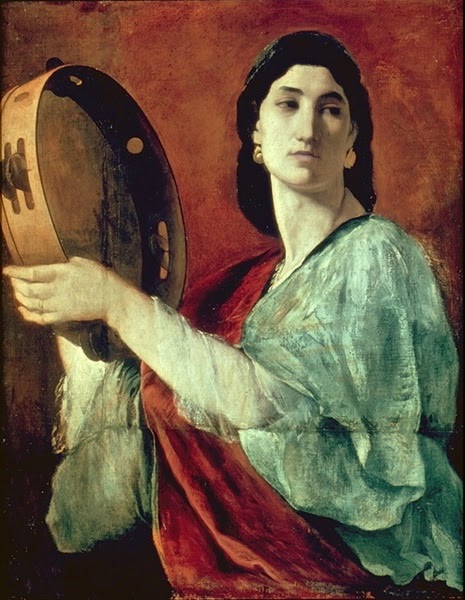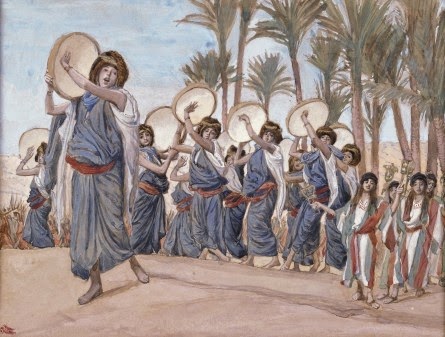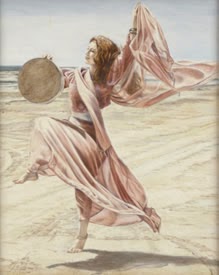Ex. 2:4–8; 15:20–21
Num. 12:1–15; 20:1; 26:59
Deut. 24:9
Micah 6:4
Her Story:
Miriam was born in Egypt during the time that the Hebrews were enslaved by the Egyptians and the Egyptians, fearful or the Hebrew’s numbers, were systematically killing all newborn Hebrew boys. Miriam was from the tribe of Levi and was the daughter of Amram (see Numbers 26:59) and Jochebed, who was the daughter of Levi (see Exodus 6:20; Numb 26:59).
When her mother Jochebed had a baby, Moses, they hid the baby for three months from the Egyptian guards. When they could no longer keep Moses hidden and they “took for him an ark of bulrushes, and daubed it with slime and with pitch, and put the child therin” (Exodus 2:3) and then Jochebed put the ark in the reeds by the river’s edge. Then Miriam “stood afar off, to wit what would be done to him” (Exodus 2:4). Eventually, the daughter of Pharaoh came to wash herself in the river and found baby Moses in the reeds. She recognized him as Hebrew baby (he would have been circumcised) but she “had compassion on him” and decided to keep him as her own. At this point Miriam came forward and asked, “Shall I go and call to thee a nurse of the Hebrew women, that she may nurse the child for thee?” (Exodus 2:7) Pharaoh’s daughter told her yes and Miriam went and brought Jochebed back to the princess. Pharaoh’s daughter told Jochebed “Take this child away, and nurse it for me, and I will give thee thy wages.” (Exodus 2:9). Jochebed was then able to take Moses back to her home and nurse him until he was weaned.
The next time we meet Miriam she was among the children of Israel as they left Egypt and fled the pursuit of the Egyptian chariots. After they miraculously passed through the Red Sea on dry ground, and the ” the Lord overthrew the Egyptians in the midst of the sea” (Exodus 14:27), the children of Israel celebrated and praised God through singing and dancing. Moses took the lead in these songs singing, “The Lord is my strength and song, and he is become my salvation: he is my God, and I will prepare him an habitation; my father’s God, and I will exalt him” (see Exodus 15: 1-19). In addition Miriam, who is called “the prophetess”, took a timbrel and all the women of Israel , “went out after her with timbrels and with dances.” (Exodus 15:20). She led them singing, “Sing ye to the Lord, for he hath triumphed gloriously; the horse and his rider hath he thrown into the sea.”
Next we see Miriam in Numbers 12 when she and her brother Aaron “spake against Moses” because he had married and Ethiopian woman. Both Aaron and Miriam disapproved of Moses’ actions and protested saying, ” Hath the Lord indeed spoken only by Moses? hath he not spoken also by us?” (Numb. 12:2). The Lord heard their protests and spoke to Moses, Miriam and Aaron in the tabernacle explaining to them that He had only called one Prophet and that, “…With him will I speak mouth to mouth, even apparently, and not in dark speeches; and the similitude of the Lord shall he behold.” (Numb. 12:6-8) After this encounter with the Lord Miriam was stricken with leprosy. Aaron and Moses both plead to the Lord on her behalf. The Lord granted their petition but before she was healed Miriam was shut out of the camp for seven days before returning to travel with them. The last we hear of her is her death (Numbers 20:1) where she was buried.
Speculations About Her:
In the Book of Jasher it says that Miriam is the reason that Moses was born because,
“… the spirit of God was upon Miriam the daughter of Amram the sister of Aaron, and she went forth and prophesied about the house, saying, Behold a son will be born unto us from my father and mother this time, and he will save Israel from the hands of Egypt. And when Amram heard the words of his daughter, he went and took his wife back to the house, after he had driven her away at the time when Pharaoh ordered every male child of the house of Jacob to be thrown into the water. So Amram took Jochebed his wife, three years after he had driven her away, and he came to her and she conceived.” (Chapter 68:1-3)
The Book of Jasher also gives more insight into what may have happened between Miriam and Pharaoh’s Daughter. It says,
“And God sent forth at that time a terrible heat in the land of Egypt, which burned up the flesh of man like the sun in his circuit, and it greatly oppressed the Egyptians. And all the Egyptians went down to bathe in the river, on account of the consuming heat which burned up their flesh. And Bathia, the daughter of Pharaoh, went also to bathe in the river, owing to the consuming heat, and her maidens walked at the river side, and all the women of Egypt as well. And Bathia lifted up her eyes to the river, and she saw the ark upon the water, and sent her maid to fetch it. And she opened it and saw the child, and behold the babe wept, and she had compassion on him, and she said, This is one of the Hebrew children.
And all the women of Egypt walking on the river side desired to give him suck, but he would not suck, for this thing was from the Lord, in order to restore him to his mother’s breast. And Miriam his sister was at that time amongst the Egyptian women at the river side, and she saw this thing and she said to Pharaoh’s daughter, Shall I go and fetch a nurse of the Hebrew women, that she may nurse the child for thee?” (Chapter 68: 15-21)
Miriam’s presence “among the Egyptian women” at the river, and her bold conversation with Pharaoh’s daughter make me suspect that she may have been among the Hebrew slaves employed in and around the Pharaoh’s household. Also we know that Jochebed didn’t haphazardly send her son down the river, Exodus says that she laid the ark in some reeds. It makes me wonder if perhaps Miriam and Jochebed, being acquainted with the princesses’s heart, didn’t strategically placed the ark somewhere where she’d be likely to find him.
Also, later in Miriam’s life she would be called “the prophetess” a title indicating that she was possessed with the gift of prophecy. It is amazing to me that, if the Book of Jasher is correct, Miriam seems to have possessed the gift of prophecy from a very young age. It was her ability to be aligned with the will and mind of God that prompted and encouraged her parents to have the faith and courage to have another child. It was because of her righteousness that Moses was born, and thus that Israel was delivered. By small and simple things great things are really brought to pass.
My Thoughts:
“For I brought thee up out of the land of Egypt, and redeemed thee out of the house of servants; and I sent before thee Moses, Aaron, and Miriam.” (Micah 6:4)
It is also especially fascinating to remember that all three of them– Moses, Aaron and Miriam– were Levites, the tribe given the responsibility to hold the priesthood and administer the ordinances of the Tabernacle. This is interesting because it seems that God was organizing His church, and priesthood authority, through them. We might make a chart that looks like this:
An organization that women are still participating, leading, and prophesying in today!










Wow! Thanks so much for sharing about Miriam. Your entire blog is, honestly, a reminder that I need to be more diligent in my scripture study. I had never considered the possibility that Miriam might be a prophetess and the Israelite General Relief Society President. 🙂 I love visiting this blog. Your words are always so thought-provoking.
I appreciate this a lot especially since one of my daughters is named after Miriam. I look forward to part 2!
Thank you so much for this, Heather. I have been quietly following your blog for years and you have brought so many beautiful things to me, I have always really enjoyed your perspective and insight. I also have the birth book which really helped me work through a lot of thoughts and feelings as I was preparing . . . You're incredible! Thank you for being a light in my life! I think you are a prophetess in your own right.
This is beautiful. I also have named one of my daughters Miriam and love how you tell her tale.